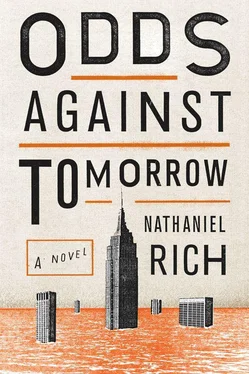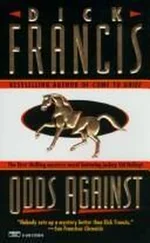The couple exchanged another look. “You know,” said Cassie, “this area is part of the Dead Zone. Canarsie, Flatlands, across to Sheepshead Bay and Gravesend — the whole swath along the water — it’s been classified as Zone Five.”
“What’s a Zone Five?”
“The unflooded areas are Zone One. Lower Manhattan is Zone Two. Downtown Brooklyn is Zone Three. They’ve had to prioritize the rebuilding effort.”
“So this is last.”
“Dead last. They’re saying they might let it go back to nature. Wetlands restoration. To serve as a natural buffer against future storms.”
It was a farsighted policy. Perhaps they’d learned the lessons of recent meteorology. The refugees on Randall’s Island who had lived in Zone 5 wouldn’t be pleased, of course. But it wasn’t anything to get concerned about now. If Seattle were any model, those legal battles wouldn’t be resolved for years. Mitchell’s thinking was now decidedly short-term.
“So, if you need us,” said Cassie, “for anything? We’ll be at the school.”
Mitchell nodded warily.
“Or we’ll see you around, I guess.”
“Cassie,” said Ronald under his breath.
“What?”
He took her by the arm. “Let’s go. He’s working.”
“There are others, you know,” said Cassie, shirking off Ronald. “There are others coming. Others like us. We want to start something here.”
Mitchell turned his back on them and bent to the dirt. But he watched the couple out of the corner of his eye as they walked away. They watched him too, glancing back every few paces. When they finally disappeared behind a ruin — not a structure, exactly, but a mound of wooden planks and bent telephone poles, like a mammoth funeral pyre, festooned with tangled copper cables — Mitchell dropped the bag of spinach seeds. The garden would have to be postponed. He needed more debris. He had to build up his wall faster. If word had gotten out, if more people were coming, he needed to insure his privacy. He would also have to make another trip to Jackpot before others started competing for supplies. And before the maggots and rats colonized the entire warehouse.
He was under no illusions. Out here in the neighborhood formerly known as Flatlands — or was it Canarsie? — he wouldn’t unearth Eden, or even some agrarian ideal. Most likely his work here wouldn’t amount to very much at all. He knew nothing, after all, about farming, fertilization, engineering, construction. Problems would arise that he could not anticipate, and he’d be comically unprepared to fix them. The weather would only become increasingly erratic. The fields might go fallow or flood. Winter would be excruciating. And a single serious injury or illness would force him to give up. There was also the danger that he might lose his nerve. Yet he doubted this. The only thing stronger than his desire to stay in the Flatlands was his aversion to the idea of returning to his old life.
A time would come, perhaps even in the next month, when he would need to sneak back to the city for supplies: a generator, a water filtration system, perhaps even wind turbines or photovoltaic panels, the kind Elsa had installed at Ticonderoga. And books: on energy harvesting, basic engineering, agriculture. Best-case scenario, he would create a few hundred square yards of farmland next to the bank building and another plot, half that size, behind the building. He had enough bottled water to last a couple of months, and after that he supposed he could collect rainwater and boil it. He’d be away from the world, yet in it more intimately than he had ever known. Doing: finally. At night he would go to bed with the smell of the orange dirt in his nostrils, the sour taste of it in the back of his throat.
The cynic in him laughed derisively. The logician in him, however, responded curtly, and not without condescension: it wasn’t a question of idealism; it was survival. In the Canarsie Bank Trust Company building he would create his own self-contained universe. This was a future. It might not be the best possible future or even a particularly comfortable future, but it was a future that he could see.
He trundled the wheelbarrow across the dirt, and the heaviness didn’t bother him because he could feel within him the first flickers of obsession, the electricity sparking in his brain like a live wire. This obsession, after all, would not be very different from those he’d already mastered. It would be based in mathematics and logic, even scenario planning and risk analysis, only now the application would be practical instead of theoretical. The work would demand much more from him than his fanciful scenario planning at FutureWorld. The stakes would be higher, too: miscalculations could lead to injury or hunger. Precision was essential. There was no escaping math, after all. It was everywhere, especially in nature. You could go so far as to say that math was nature. Pi described the arc of a rainbow, the way ripples spread in a body of water, the dimensions of the moon and sun. Fractals could be observed in halved sections of red cabbage, the topography of deserts, the branching of lightning bolts. And take the old man glaring out from his shirt, Leonardo Fibonacci, who discovered that a basic number sequence predicted the arrangement of scales on a pinecone, the distribution of petals on flowers, the spiral of a snail shell, the furcation of veins in the human body, even the structure of DNA. When all the people were gone, the numbers would persist. Always the numbers, an infinite chain running to the edge of the universe.
Once the property was running, he might even invite his parents to visit. Rikki would be glad that he had escaped Kansas City and its nightmares forever, and Tibor would be proud to see the landownership gene resurface in his son. Slumlord begetting fieldlord. From the haystacks of a farm outside of Györ to giant rotating turbine blades above his castle in the Flatlands.
And yet — and yet — despite all this, he would be alone.
Yes, there was Hank, there were Cassie and Ronald, who seemed like neo-hippies from Ticonderoga, and perhaps there would be others, settlers from Randall’s Island and elsewhere. But he would keep his distance, and the wall around him would grow tall with trash and plaster. The purest intellectual pursuits were always solitary, weren’t they? You had to be uncompromising and self-disciplined. No great mathematical problem was ever solved by a team of mathematicians (there was the Appel-Haken solution to the four-color theorem, but really their supercomputer deserved the credit); no brilliant machine was ever conceived in tandem (the Wright brothers were good engineers, but they honed technology developed by others); and no literary masterpiece was ever written by a group of collaborators (the Bible notwithstanding). Elsa had understood this. There were others working with her on the farm, working for her, but it was her plan, and she was uncompromising in its execution. And what Mitchell was after — an impregnable, self-contained, self-sustaining fortress — would require the same level of dedication. No place would be reserved for anyone else.
The wheelbarrow hit against a single red brick wedged into the earth. He kicked at it, hard, and it budged enough so that he could pull it out of the soil, like a rotten tooth from a gum.
His plan had other satisfactions. There would be no one for him to grow attached to, no one he would have to rely on but himself. He would avoid nostalgia; forget the past, forget FutureWorld, forget the whole tangled cycle of anxiety and fear and paranoia that got him here. Instead, his teeming energies — or, to be honest, his fanaticism —his fanaticism would be spent in the fields, building-shaping-making-growing-spreading. Then, at night, to bed alone. Alone with his numbers and their cold, metallic comforts.
Читать дальше












